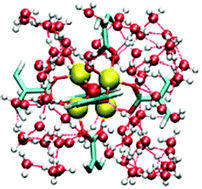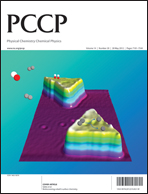Early stages in the degradation of metal–organic frameworks in liquid water from first-principles molecular dynamics†
Abstract
IRMOF-1 structures are known to suffer lattice break-up when exposed to water-rich environments, a limiting factor in their everyday use. To shed light on the underlying mechanism of disruption, the role of the metal in the secondary building unit (SBU) has been systematically investigated, and the global behaviour of IRMOF-1-type structures with the three metals Zn, Mg, and Be studied by Born–Oppenheimer Molecular Dynamics in liquid


 Please wait while we load your content...
Please wait while we load your content...